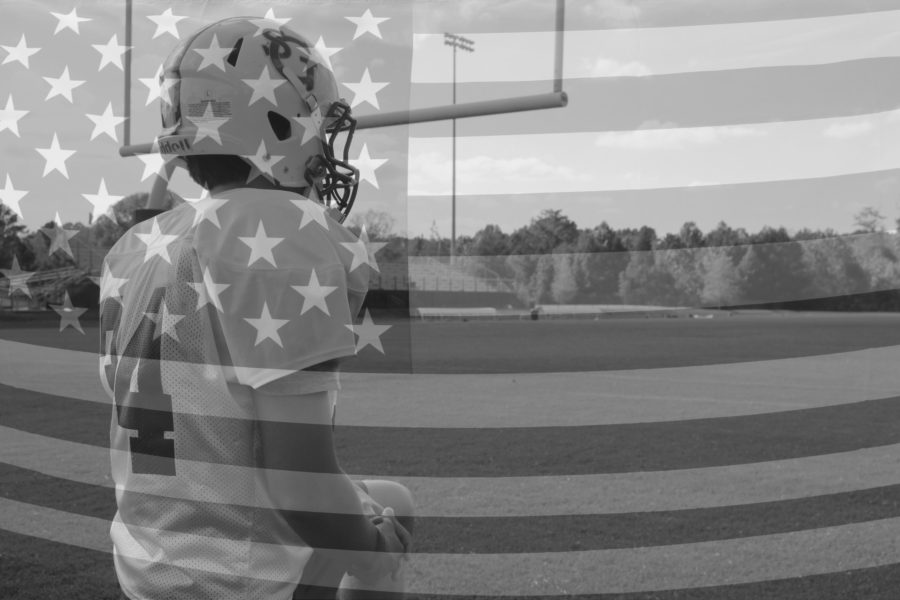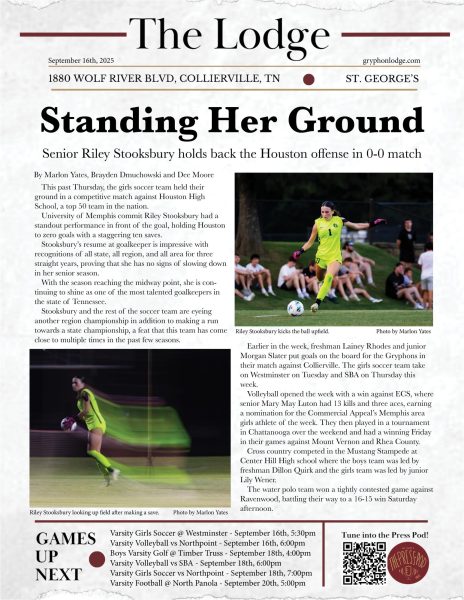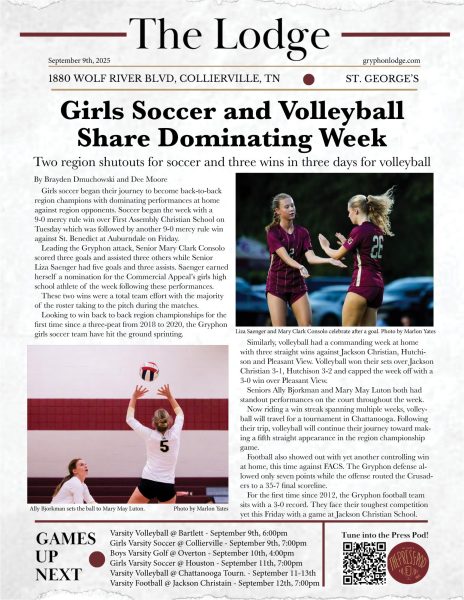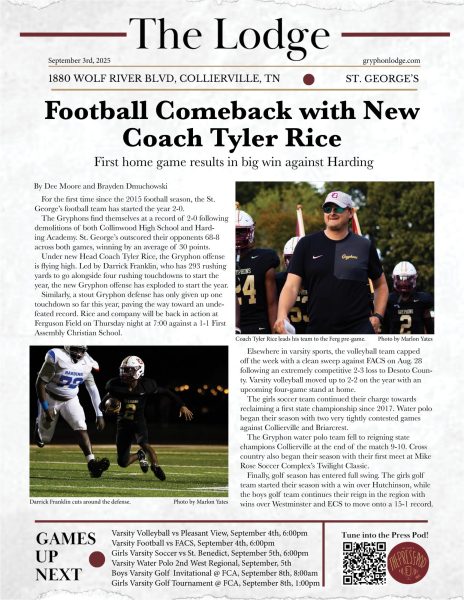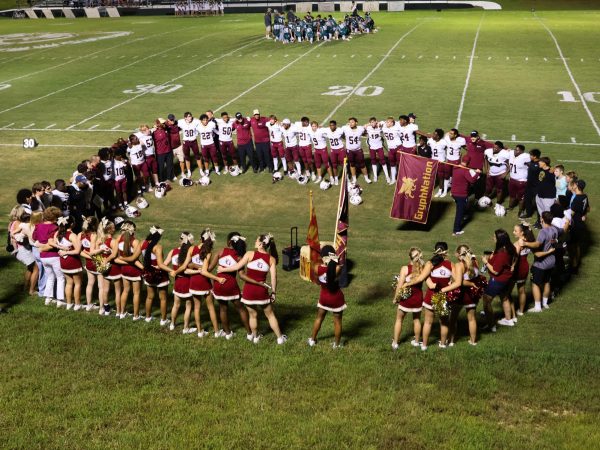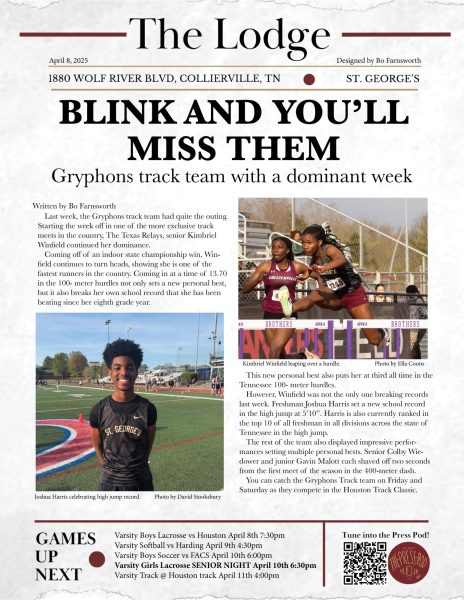Colin Kaepernick’s lone protest sparks a movement
Photo: Rachel Ducker
A senior football player walks onto the Ferguson Field. Athletes across the nation, inspired by Colin Kaepernick, have been protesting the national anthem.
On August 14, 2016, Colin Kaepernick started a movement. Since that day, the quarterback for the San Francisco 49ers has taken a knee during the national anthem every football game in order to protest the oppression of minorities in the United States.
Quickly gaining popularity amongst NFL players, the protests spread to other professional sports, including the National Women’s Soccer League and the NBA. First joined by Eric Reid, a fellow 49er, Kaepernick was soon followed by Jeremy Lane, cornerback for the Seattle Seahawks, Brandon Marshall, a Denver Broncos linebacker and Michael Thomas, a Seahawks safety.
The NFL is not the only professional league where players have supported Kaepernick’s protests. Megan Rapinoe, a player on the US women’s national soccer team, knelt during the national anthem of a NWSL game against the Chicago Red Stars in support of Kaepernick.
Rapinoe, who is openly gay, said to SB Nation she knows “what it means to look at the flag and not have it protect all of your liberties.”
Unlike the NFL, which released a statement saying “players are encouraged but not required to stand during the playing of the national anthem,” the U.S. soccer league asked for players and coaches “to reflect upon the liberties and freedom we all appreciate in this country” during the national anthem.
In order to prevent Rapinoe from protesting before the Washington Spirit v. Seattle Reign game, the Spirit moved the national anthem to play before both teams came onto the field.
At first, only professional athletes joined Kaepernick in his protests. Soon after, though, college and high school football players were kneeling during the national anthem.
On Sept. 16, all football players and coaches at James A. Garfield High School near Seattle knelt during the national anthem. Head coach Joey Thomas said the protests would continue for the rest of the season. Meanwhile, 12 high school football players from Laguna Creek High School near Sacramento knelt during the national anthem and were told by a number of parents to stand up.
Unlike Kaepernick, who has the support of his team and several other NFL players, some high schoolers were reprimanded for their protests. Shemar Cooper, a sophomore at Eisenhower High School in Blue Island, Ill., was verbally harassed by teachers for sitting while the national anthem played in class. One teacher attempted to physically remove him from his seat in a classroom.
The players and coaches for the Beaumont Bulls, a football team of 11 and 12-year-olds from Texas, knelt during the national anthem in support of Kaepernick. Instead of receiving support, the young boys received death threats and were told if they knelt again, they would be kicked off the team.
Across the country and even at St. George’s, people are split between support and apprehension concerning Kaepernick’s protests. Senior Ben Glass, who is committed to play football at United States Naval Academy next year, said he respects Kaepernick’s opinion but disagrees with how he is protesting. “Football’s a sport to have fun,” Glass said. “I don’t really think it should be political.” Meanwhile, senior Marshall Shanks, who actively supports Black Lives Matter and hosted a teen forum for the movement in August, agrees with Kaepernick’s protests and has no problem with him using his fame as a platform to spread awareness for his movement.
“I feel like his protest is right but just because of his name, it’s making him seem like he’s a bad guy,” Shanks said. “It’s because it’s Colin Kaepernick, a quarterback on a big franchise team in the NFL.”
Kaepernick repeatedly states that while he is not anti-American, he is not proud of how the United States is treating its minorities.
“I am not looking for approval. I have to stand up for the people that are oppressed,” Kaepernick said to SB Nation.
Senior Noah Pope, a captain of the Gryphons’ football team alongside Glass, was unsure of what would happen if the Gryphons’ football team decided to protest.
“I do think there would be a lot of people who would be mad about it, and there would be a lot of people who agree with it, just like there is in the country,” Pope said.
Though Kaepernick’s movement is spreading rapidly across the nation, St. George’s policies remain unaffected.
“We haven’t really changed anything we’ve done in the past. We trust our kids to do what’s right,” Athletic Director Tom Densford said. While St. George’s has taken a hands-off approach concerning the protests, other area schools have responded more directly.
“We actually had a talk, maybe the third week, that we weren’t allowed to [protest], and it was more of a school policy. We would’ve been in trouble with the school if we did, but none of us really had any intention to do it anyways,” Briarcrest Christian School quarterback Jackson Walker said. “If we protested, it would be a school punishment. The office would get involved, and we would have to go in there.”
Though Houston High School coaches did not directly say it, Mark Conlee, a senior and captain of the Mustangs’ football team, said that it was understood that players were not allowed to protest.
“I think there are ways that don’t bring attention to yourself instead of attention to the problem,” Conlee said. “I think, in this situation, he’s put all the attention on himself and on what he’s going to do before games, instead of on the issue. His point is to bring all the attention to the issue, and I don’t think he’s gotten that across.”
On the other hand, Pope sees this attention as a good thing, believing the controversy is furthering the movement.
“In order for [the protest] to be as effective as Kaepernick wants it to be, there has to be a lot of controversy that needs to happen,” Pope said.
The only thing that remains is to see if Kaepernick’s protests will bring about the change he hopes for.


